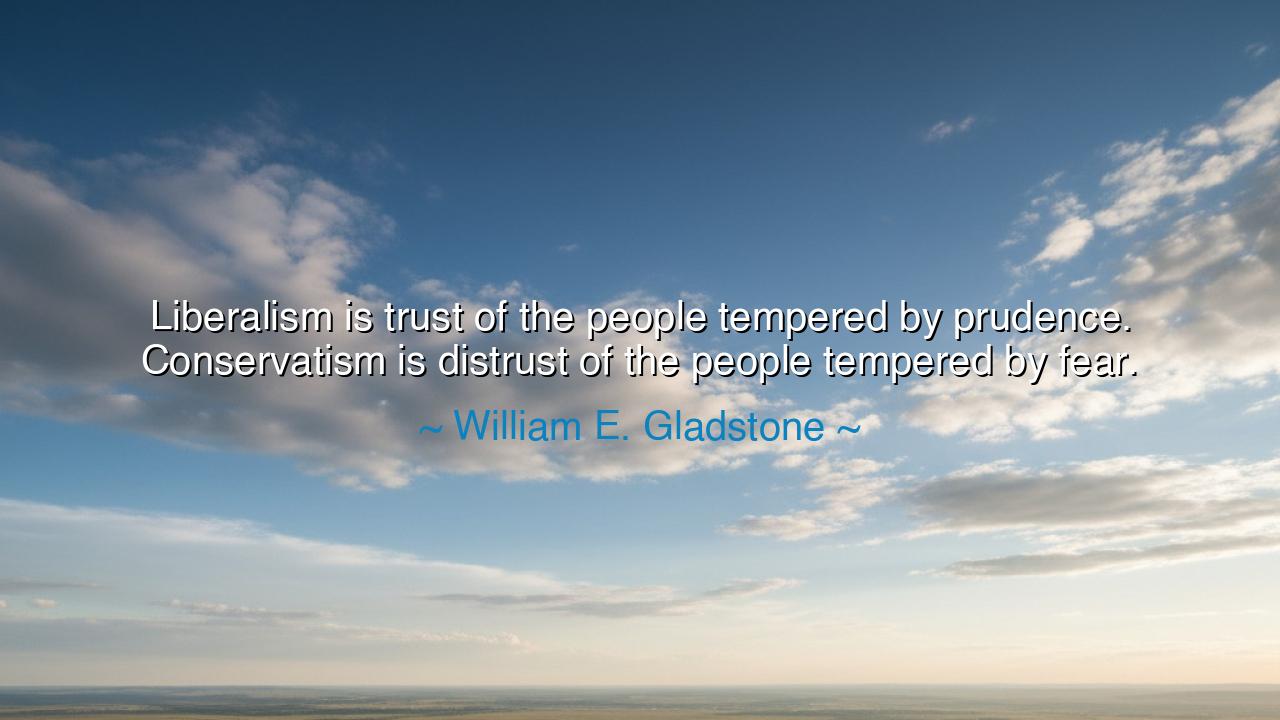
Liberalism is trust of the people tempered by prudence.
Liberalism is trust of the people tempered by prudence. Conservatism is distrust of the people tempered by fear.






Hear the words of William Ewart Gladstone, the Grand Old Man of British politics, who reigned for decades as a master of debate, reformer of laws, and champion of the common man: “Liberalism is trust of the people tempered by prudence. Conservatism is distrust of the people tempered by fear.” In these words, he does not merely describe parties or labels, but two great tempers of the human heart—the one that looks to the people with confidence, and the one that gazes upon them with suspicion. Gladstone, who lived in an age of vast change, believed that the destiny of a free nation was decided by whether its rulers placed their faith in its citizens or trembled before them.
The meaning of this saying shines with clarity. Liberalism, in Gladstone’s vision, is a willingness to entrust power to the people, to expand suffrage, to allow them a voice in shaping their destiny. Yet it is not reckless abandon—it is “tempered by prudence,” recognizing that wisdom must guide reform so that liberty does not collapse into chaos. Conservatism, on the other hand, begins from the opposite assumption: that the people cannot be trusted, that their passions are dangerous, their choices suspect. It is “tempered by fear,” a fear that if power is loosed from the grasp of elites, society will crumble. In this contrast, Gladstone exposes the difference between a politics of hope and a politics of fear.
The origin of this declaration lies in Gladstone’s own career. As Prime Minister of Britain in the nineteenth century, he fought for reforms that broadened the right to vote, reduced the power of entrenched privilege, and sought to make government more accountable. He believed that the common man, if given a voice, would rise to the responsibility of citizenship. Yet his opponents, the Conservatives of his day, resisted many of these reforms, convinced that the masses were too easily swayed, too uneducated, too dangerous to be trusted with power. In this clash, Gladstone coined his piercing observation, capturing the very soul of their disagreement.
History bears witness to this conflict again and again. Consider the United States in the era of the Civil Rights Movement. Leaders like Martin Luther King Jr. called upon the nation to trust the people—to extend the franchise, to honor their voices, to allow freedom to flourish. Their opponents, however, resisted, fearing unrest, upheaval, and the loss of entrenched hierarchies. In the end, progress came only when the politics of trust triumphed over the politics of fear. Here we see Gladstone’s maxim alive: liberalism, tempered by prudence, expanded freedom; conservatism, bound by fear, resisted it.
And yet, there is a sobering truth in his words as well. Trust, if unchecked, can dissolve into naïveté. Fear, if unchecked, can become tyranny. Both must be tempered, one by prudence, the other by courage. The great danger of politics is when trust forgets prudence or when fear overwhelms all reason. Gladstone knew this balance well, for his reforms were not reckless leaps, but steady steps forward, built on the foundation of wisdom and experience.
The lesson for us is timeless. In our own lives, as in the life of nations, we must ask: do we act out of trust or out of fear? Do we give others the chance to rise, or do we keep them bound, afraid they might fail? Whether in government, in friendship, or in family, the same principle holds true: only by extending trust, tempered with wisdom, can true growth and harmony be achieved. Fear may preserve order for a time, but it will never create greatness.
Therefore, beloved listener, let Gladstone’s words burn within you. Choose the path of trust, but walk it with prudence. Do not let fear rule your dealings with others, for fear breeds only suspicion, division, and decay. Instead, believe in the dignity of your fellow man, give them the chance to rise, and guide them with wisdom. For a people trusted will become trustworthy, and a people feared will become dangerous.
So remember always the maxim of Gladstone: “Liberalism is trust of the people tempered by prudence. Conservatism is distrust of the people tempered by fear.” Let this truth remind you to lead not by fear, but by faith in others, and to temper your faith with wisdom. In this balance lies not only political strength, but the secret of all human fellowship.






AAdministratorAdministrator
Welcome, honored guests. Please leave a comment, we will respond soon